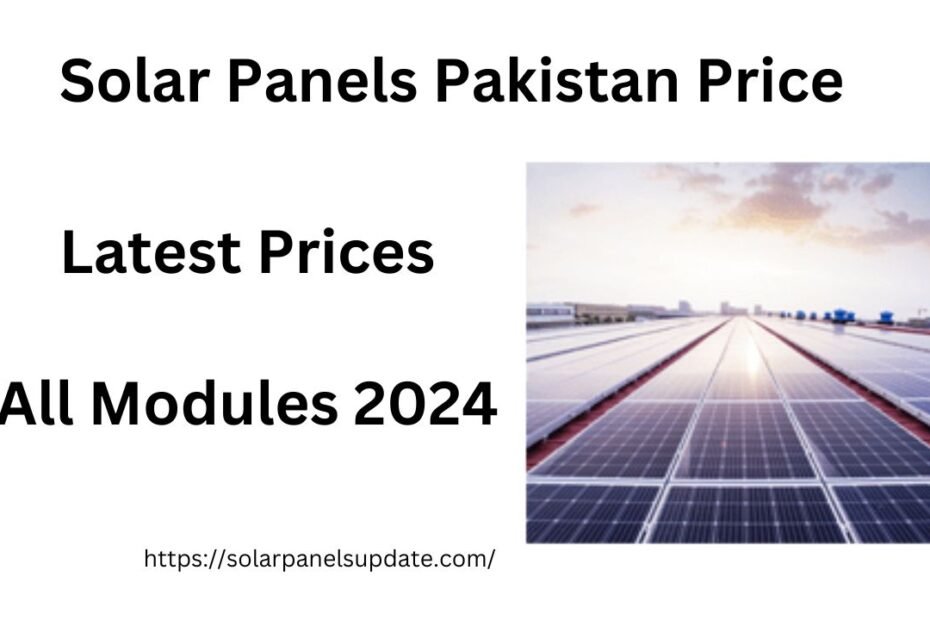With energy crises and rising electricity costs solar panels are gaining immense popularity in Pakistan. Whether you’re a homeowner or a business solar panel prices in Pakistan can help you make an informed decision. This article provides a detailed breakdown of the latest prices, the factors influencing them, types of solar panels and other essential information.

Current Solar Panels Pakistan Price (2024)
The prices of solar panels in Pakistan vary based on the type capacity and brand. Below is a table showing the average real-time prices:
| Solar Panel Type | Capacity (Watt) | Price Range (PKR) | Brands Available |
|---|---|---|---|
| Monocrystalline Panels | 150W – 550W | 15,000 – 20,000 | Canadian Solar, JA Solar |
| Polycrystalline Panels | 150W – 400W | 12,000 – 22,000 | Trina Solar, Longi |
| Thin-Film Solar Panels | 100W – 200W | 9,000 – 25,000 | Sharp, First Solar |
| Half-Cut Cell Panels | 450W – 600W | 17,000 – 21,000 | Jinko, Suntech |
Why Prices Fluctuate?
- Exchange Rate Impact: As most solar panels are imported, fluctuating USD-to-PKR rates affect their prices.
- Global Supply Chain: Global disruptions in raw materials, such as silicon, influence the cost.
- Government Taxes and Duties: Import duties impact prices; changes in taxation policies directly affect panel costs.
- Market Demand: During peak summer months or power outages, demand increases, pushing up prices.
Types of Solar Panels in Pakistan
- Monocrystalline Panels:
- High efficiency (up to 22%).
- Works well in low-light conditions.
- Higher cost compared to other types.
- Polycrystalline Panels:
- Slightly less efficient than monocrystalline panels (up to 18%).
- Lower cost, ideal for large installations.
- Thin-Film Solar Panels:
- Lightweight and flexible.
- Best for low-sunlight areas, but lower efficiency.
- Half-Cut Cell Panels:
- Newer technology offering higher efficiency.
- Performs better in shaded areas.
How to Choose the Right Solar Panel?
- Check Energy Requirements: Calculate your daily energy consumption to determine the number of panels needed.
- Efficiency vs. Budget: If efficiency matters more, go for monocrystalline panels. If the budget is tight, polycrystalline may be suitable.
- Location and Sunlight Availability: In areas with frequent shading, half-cut cell panels are more effective.
Installation Costs in Pakistan
In addition to the panel price, installation costs vary based on system size and complexity:
- Residential System (3-5 kW): PKR 50,000 – 100,000
- Commercial System (10-20 kW): PKR 200,000 – 500,000
- Net Metering Setup: PKR 30,000 – 50,000
Is Solar Power a Good Investment in Pakistan?
Yes, investing in solar panels can reduce your electricity bill by 70-80% and provide long-term savings. With the availability of net metering, users can sell excess power to the grid, further improving the return on investment.
Payback Period:
- On average, solar panels pay for themselves within 3-5 years through savings on energy bills.
Government Incentives and Net Metering in Pakistan
The Pakistani government encourages solar power adoption through net metering policies, allowing homeowners and businesses to sell excess electricity to the national grid. The National Electric Power Regulatory Authority (NEPRA) oversees the process. You can also check Solar Converter Price in Pakistan 2024
Top Solar Panel Brands in Pakistan (2024)
- JA Solar – Known for high efficiency and reliability.
- Canadian Solar – Offers value for money with durable panels.
- Trina Solar – Ideal for commercial projects.
- Jinko Solar – Popular choice for residential installations.
Conclusion
Switching to solar power is a wise investment in Pakistan’s energy-scarce environment. With rising electricity prices, solar panels offer an eco-friendly, cost-effective solution for residential and commercial users. prices of solar panels in Pakistan and choosing the right system can help you make an informed decision that maximizes savings and ensures long-term benefits.
FAQs
How many solar panels are needed for a 5kW system?
To establish a 5kW solar system, you typically need around 12 to 14 panels, assuming each panel has a capacity of 400-450W. The exact number may vary depending on the specific wattage of the panels chosen and the energy needs of the household or business. Conducting a detailed energy audit can help determine the precise requirements for optimal performance.
Can I use solar power during load-shedding?
Yes, you can use solar power during load-shedding, especially if your solar system includes a battery storage option or a hybrid inverter. This setup allows you to store excess energy generated during sunny days for use during power outages, ensuring a continuous electricity supply for your appliances.
Does the government offer subsidies on solar panels?
While there are no direct subsidies for purchasing solar panels, the Pakistani government has implemented a net metering policy. This policy allows solar panel owners to sell excess electricity back to the grid, providing a financial incentive that can offset installation costs and improve the return on investment over time.
What factors should I consider when buying solar panels?
When purchasing solar panels, consider factors such as energy requirements, panel efficiency, warranty and lifespan, brand reputation and budget. It’s also essential to evaluate the installation costs and whether the chosen panels are compatible with your current electrical system. Consulting with a reputable solar provider can help you navigate these considerations effectively.
